Table of Contents
Good communication is the cornerstone of any healthy relationship with another person, whether that relationship be social, romantic, or professional. It is our highly developed communication skills that make human beings separate from the rest of the animal kingdom. No other creature can talk about the weather, muse on their own death, or hold a discourse on the works of Plato.
And yet, the overabundance of communication opportunities presented to us by the information age is recognized by many as a bad thing, leading to more noise than signal. Thus, it is important to disconnect and to end the flow of communication for periods of time, to listen to the self and, sometimes, to listen to nothing at all.
Indeed, the amount of information provided by social media and the Internet is not only easy to get lost in, it often contains information that we’re better off not even knowing. In a world dominated by rapid-fire hot takes, it is important to once in a while remember that not everything that happens requires our opinion or our commentary.
But don’t take our word for it. Read these quotes by some of the greatest minds of human history and see what they have to say about when to communicate — and when to not.
Stephen Hawking
“For millions of years, mankind lived just like the animals. Then something happened which unleashed the power of our imagination. We learned to talk and we learned to listen. Speech has allowed the communication of ideas, enabling human beings to work together to build the impossible. Mankind’s greatest achievements have come about by talking, and its greatest failures by not talking. It doesn’t have to be like this. Our greatest hopes could become reality in the future. With the technology at our disposal, the possibilities are unbounded. All we need to do is make sure we keep talking.”
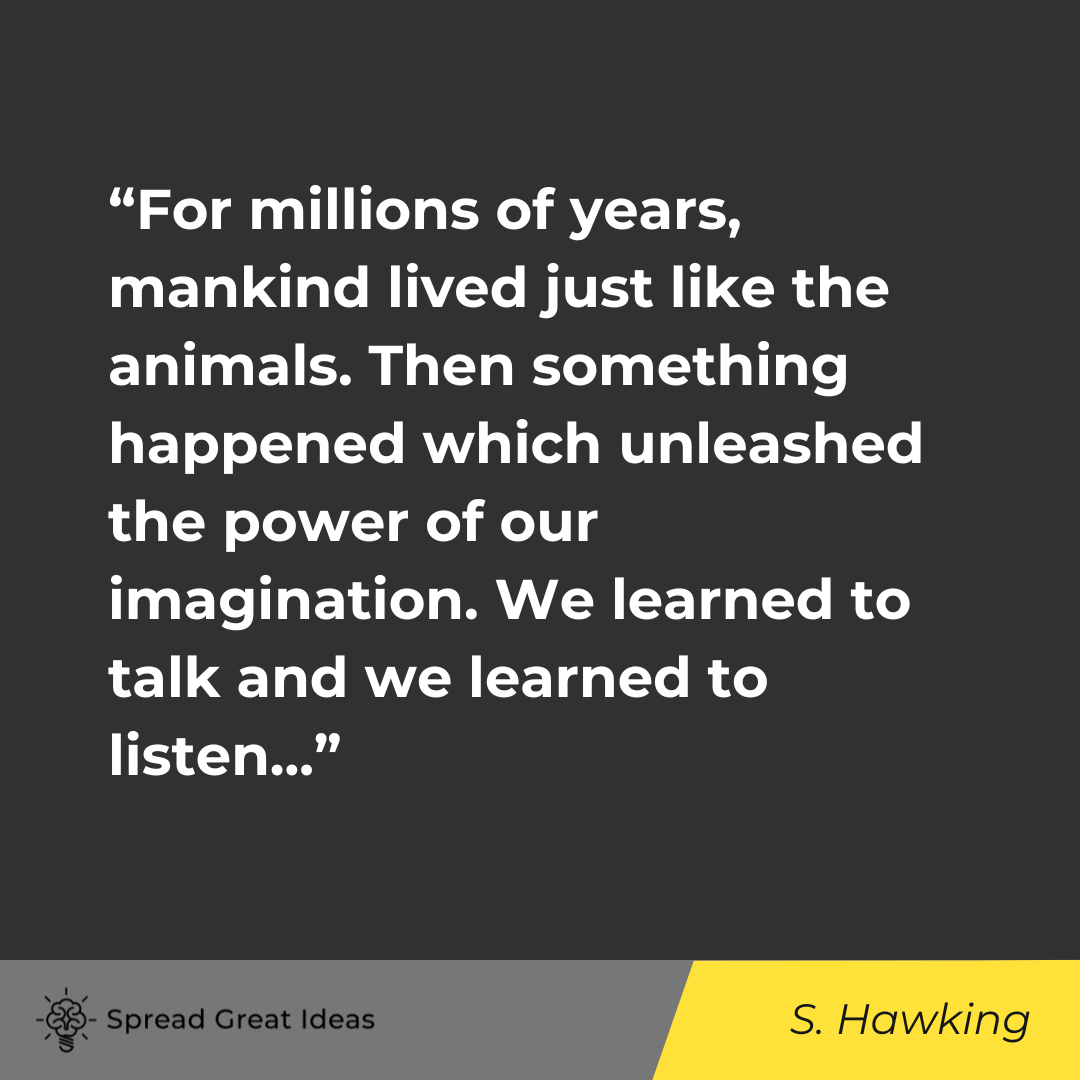
Stephen Hawking’s quote encapsulates the transformative power of human communication. Through speech, humanity transcended mere animal existence, unlocking the boundless potential of imagination. Language enabled collaboration, facilitating the realization of seemingly impossible feats. Hawking warns against the perils of silence, highlighting how failures often stem from communication breakdowns. Yet, he offers optimism for the future, emphasizing the limitless possibilities afforded by technology. By continuing to communicate, humanity can aspire to turn its greatest hopes into tangible realities. Hawking’s words serve as a call to action, urging us to embrace dialogue as the cornerstone of progress and achievement.
Charles Dickens
“A wonderful fact to reflect upon, that every human creature is constituted to be that profound secret and mystery to every other.”
– Charles Dickens, A Tale of Two Cities
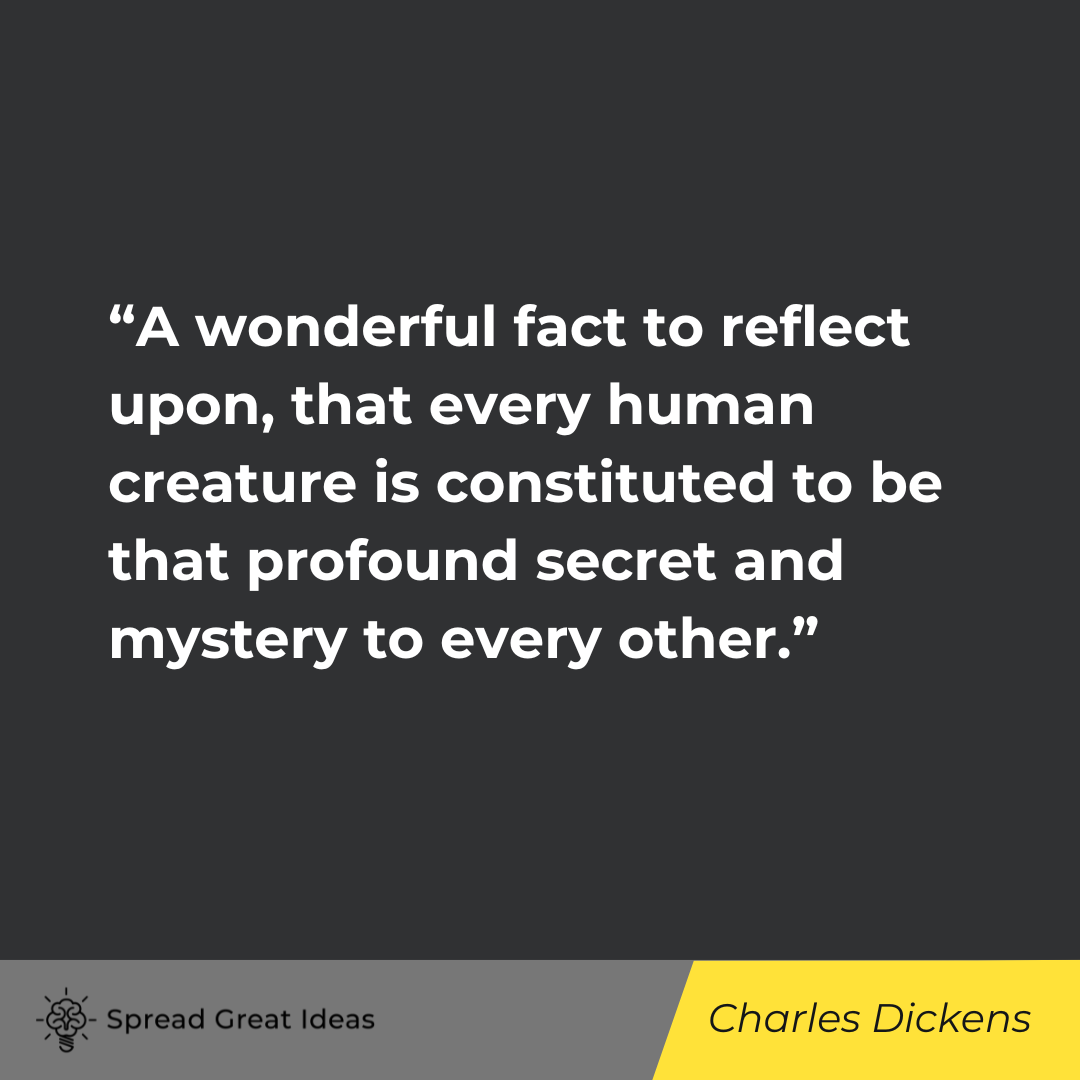
In this poignant reflection from “A Tale of Two Cities,” Charles Dickens illuminates the enigmatic essence of human nature. Each individual, he suggests, is a universe unto themselves, harboring depths and complexities beyond comprehension. Despite our shared existence, we remain fundamentally inscrutable to one another, shrouded in the mysteries of our inner worlds. Dickens invites us to marvel at this wondrous truth, emphasizing the inherent mystery that binds humanity together. Through introspection and empathy, we may catch fleeting glimpses of one another’s secrets, yet the full breadth of our individuality remains forever tantalizingly beyond reach.
William Hazlitt
“The art of conversation is the art of hearing as well as of being heard.”
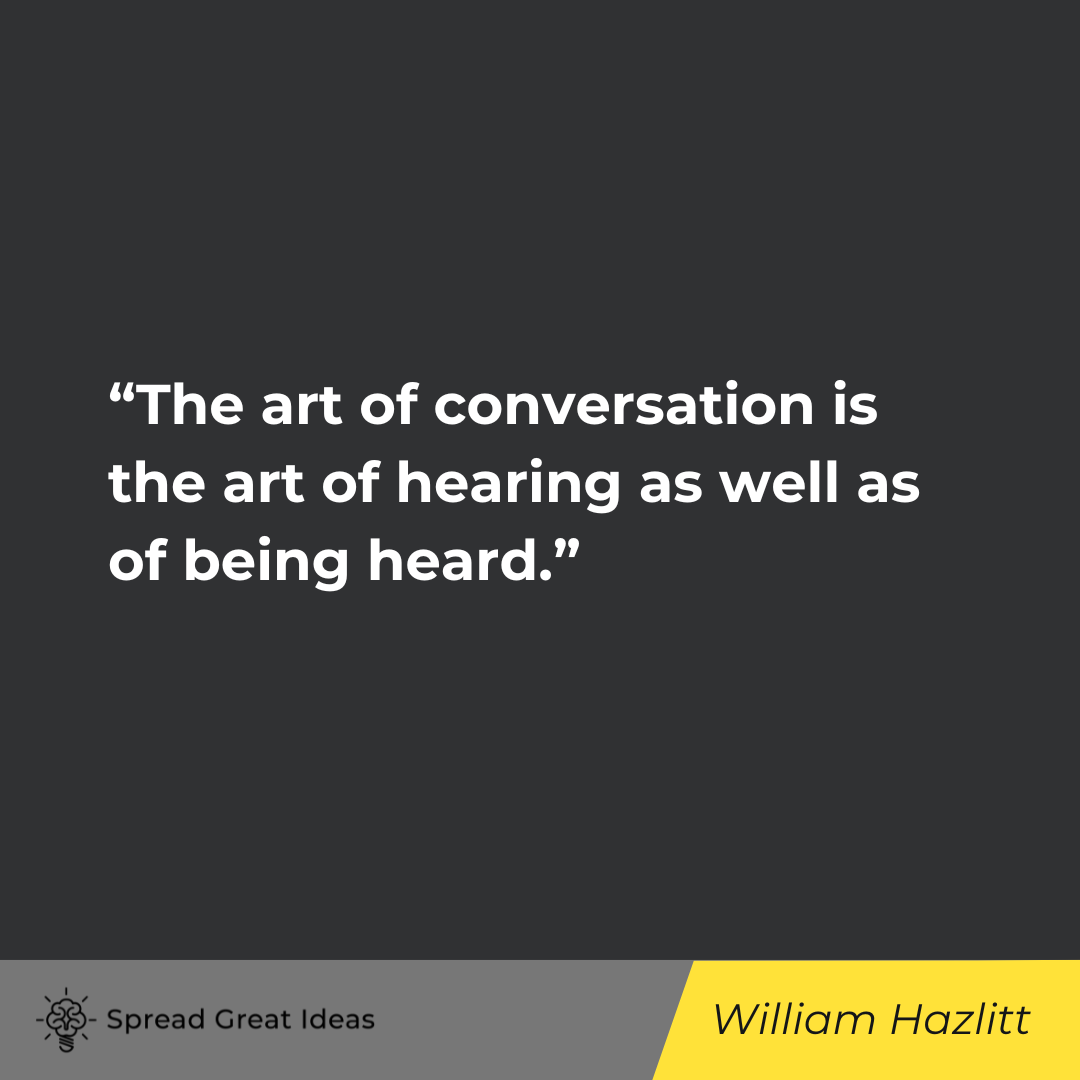
William Hazlitt encapsulates the essence of meaningful dialogue in his astute observation: “The art of conversation is the art of hearing as well as of being heard.” True communication transcends mere vocal exchange; it requires attentive listening and sincere understanding. Hazlitt emphasizes reciprocity, highlighting the importance of both speaking and listening in the conversational dynamic. To truly engage with others, one must not only express oneself but also empathetically absorb their perspectives. In mastering this delicate balance, individuals cultivate deeper connections and enriching exchanges, elevating conversation from mere discourse to a profound exchange of ideas and emotions.
Vincent Van Gogh
“Well, then, what can I say; does what goes on inside show on the outside? Someone has a great fire in his soul and nobody ever comes to warm themselves at it, and passers-by see nothing but a little smoke at the top of the chimney and then go on their way.”
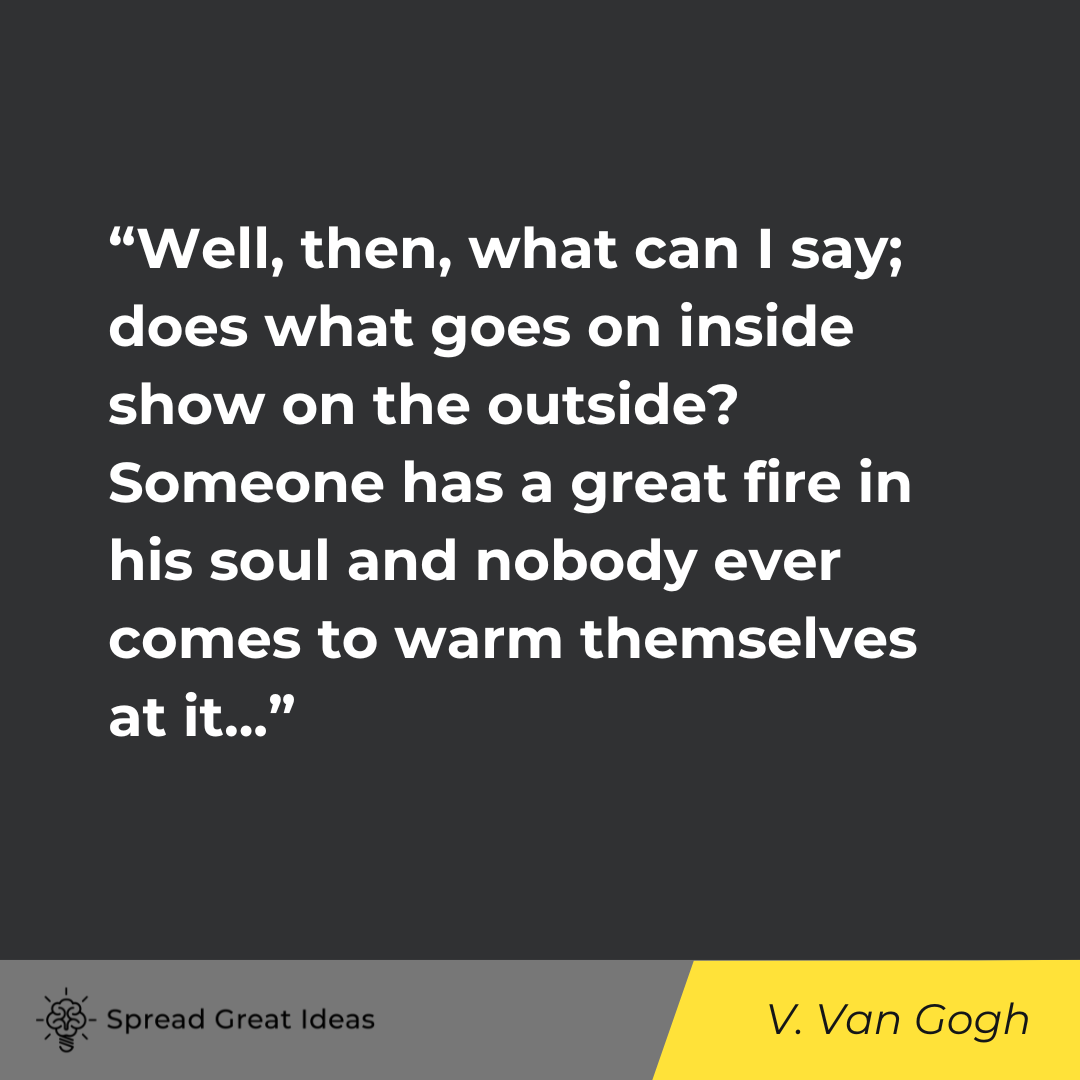
Vincent Van Gogh’s introspective musing delves into the profound solitude of the human experience. Through metaphorical imagery, he illustrates the disconnect between inner depth and outward perception. The metaphor of a hidden fire within the soul, unnoticed by passers-by, evokes a poignant sense of isolation. Despite the intensity of one’s emotions or creativity, others may only glimpse superficial signs, missing the profound depths beneath. Van Gogh captures the frustration of unacknowledged passion and the longing for genuine connection. His words resonate with those who feel unseen, urging us to recognize the hidden fires in others and offer them warmth and understanding.
Ernest Hemingway
“When people talk, listen completely. Most people never listen.”
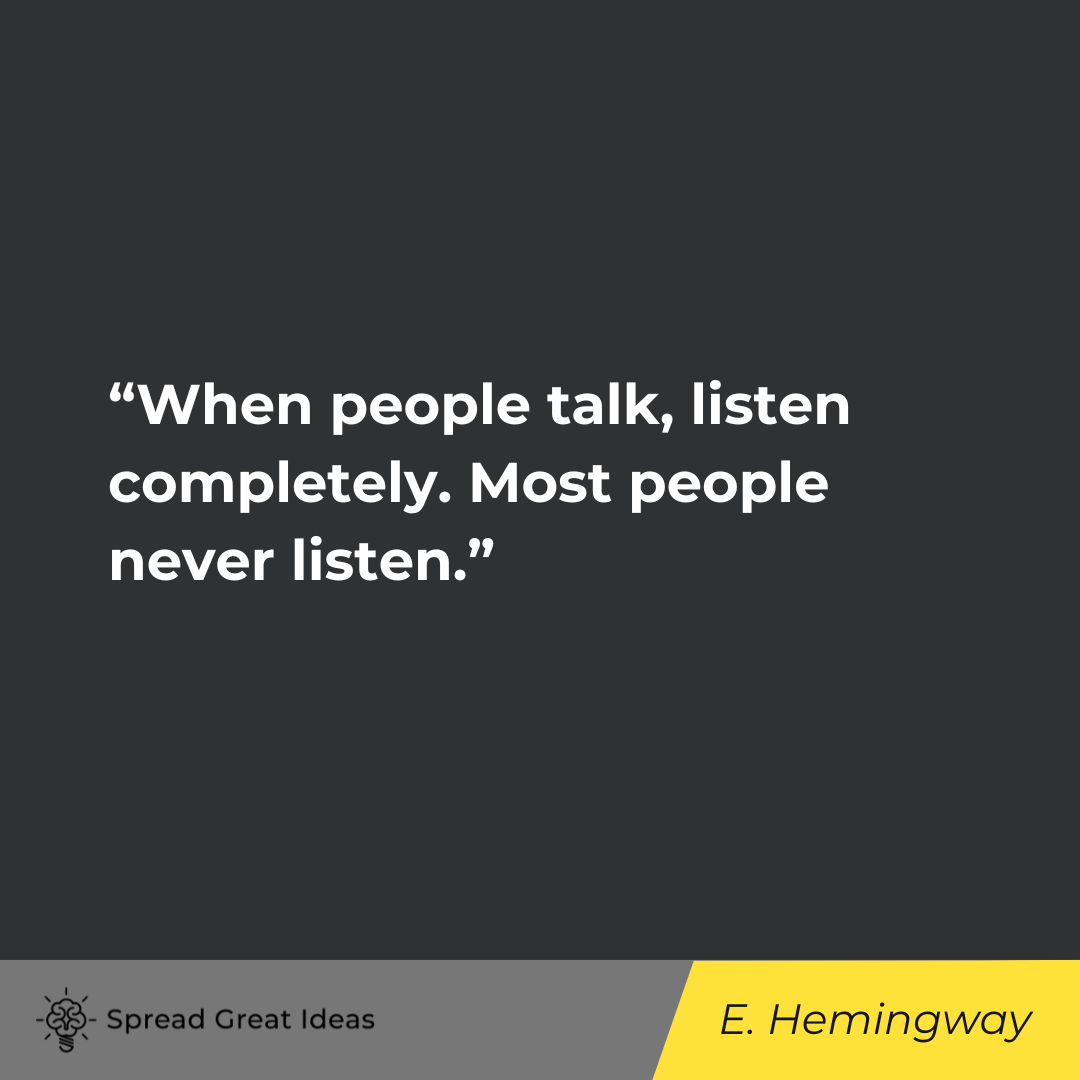
Ernest Hemingway’s succinct yet powerful observation underscores the art of active listening in interpersonal communication. By urging complete attentiveness when others speak, he highlights a common failing in human interaction: the tendency to hear but not truly listen. Hemingway suggests that genuine listening is a rare skill, often overshadowed by the urge to respond or the distraction of one’s own thoughts. To truly understand others and foster meaningful connections, he implies, one must devote full attention to their words, emotions, and intentions. In doing so, we honor the essence of communication and deepen our understanding of one another.
Fyodor Dostoevsky
“Much unhappiness has come into the world because of bewilderment and things left unsaid.”
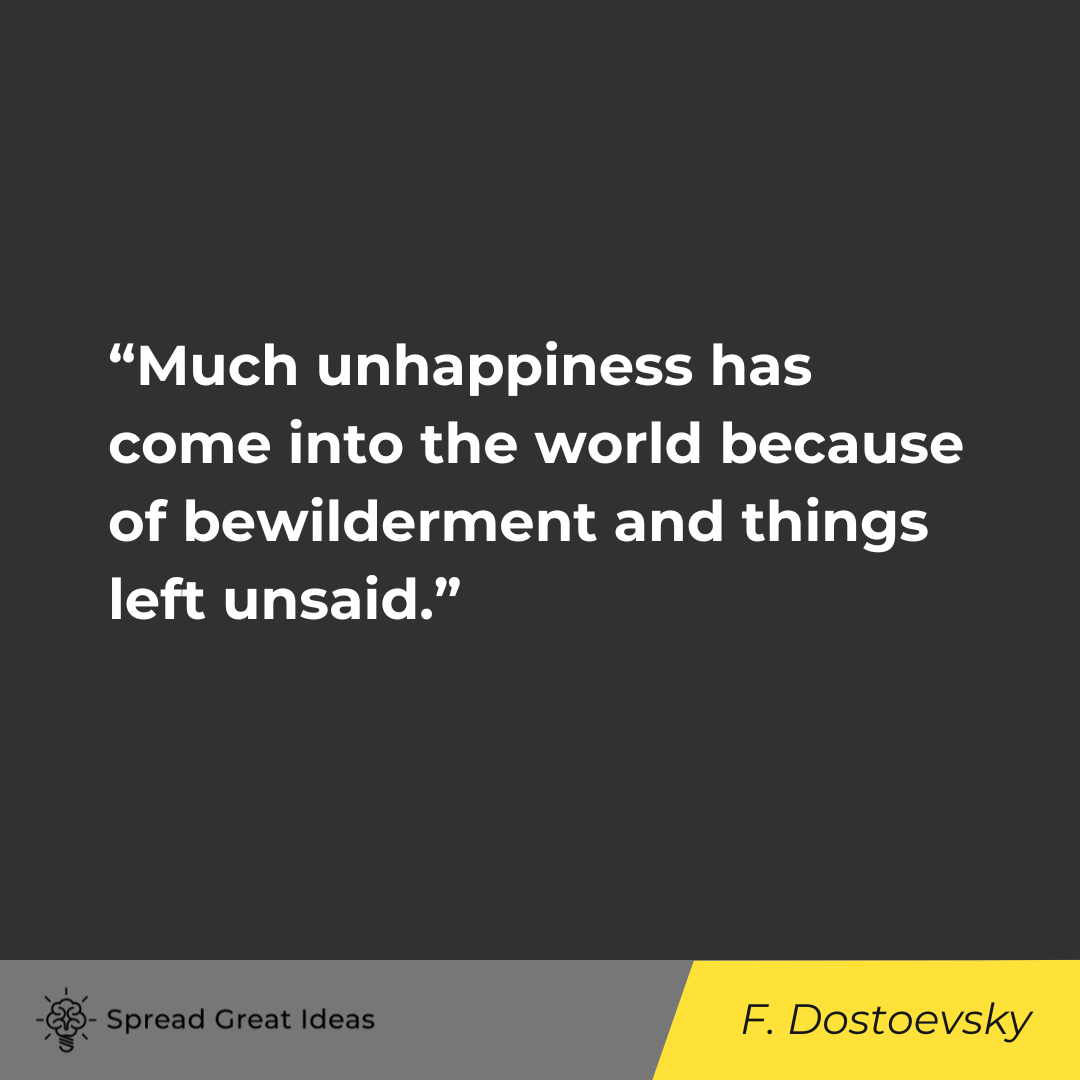
Fyodor Dostoevsky, with characteristic insight, delves into the profound consequences of misunderstanding and unspoken truths in human relationships. His observation speaks to the immense weight carried by unexpressed feelings and unclarified thoughts. By leaving things unsaid, individuals invite confusion and misinterpretation, sowing the seeds of unhappiness. Dostoevsky suggests that clarity and open communication are essential for emotional well-being and harmony. Through honest dialogue, misunderstandings can be dispelled, and connections strengthened. His words serve as a poignant reminder of the importance of speaking truthfully and openly, lest the silence breed discontent and sorrow in the human experience.
Haruki Murakami
“Our hearts are not stones. A stone may disintegrate in time and lose its outward form. But hearts never disintegrate. They have no outward form, and whether good or evil, we can always communicate them to one another.”
– Haruki Murakami, After the Quake
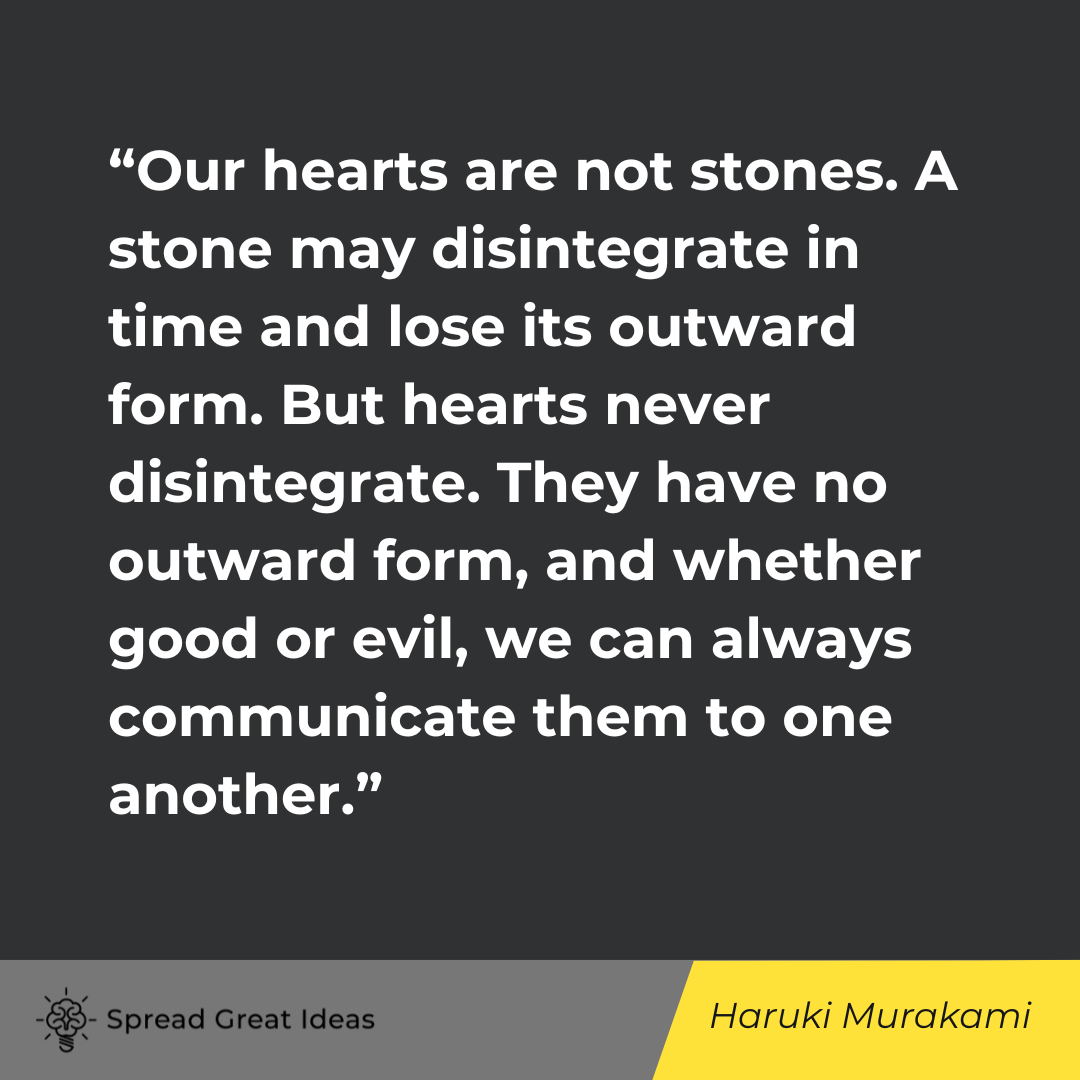
Haruki Murakami’s introspective reflection delves into the enduring nature of human emotions. He poetically contrasts the transient nature of physical objects with the perpetual essence of the heart. Unlike stones, which may crumble and fade, hearts remain immutable, their essence transcending time and tangible form. Murakami suggests that despite the intangibility of emotions, they possess a profound communicative power, capable of traversing boundaries of good and evil. Through this lens, he underscores the universality of human experience, where empathy and connection thrive. Murakami’s words invite contemplation on the resilience and inherent empathy of the human heart in the tapestry of existence.
Henry David Thoreau
“Speech is for the convenience of those who are hard of hearing; but there are many fine things which we cannot say if we have to shout.”
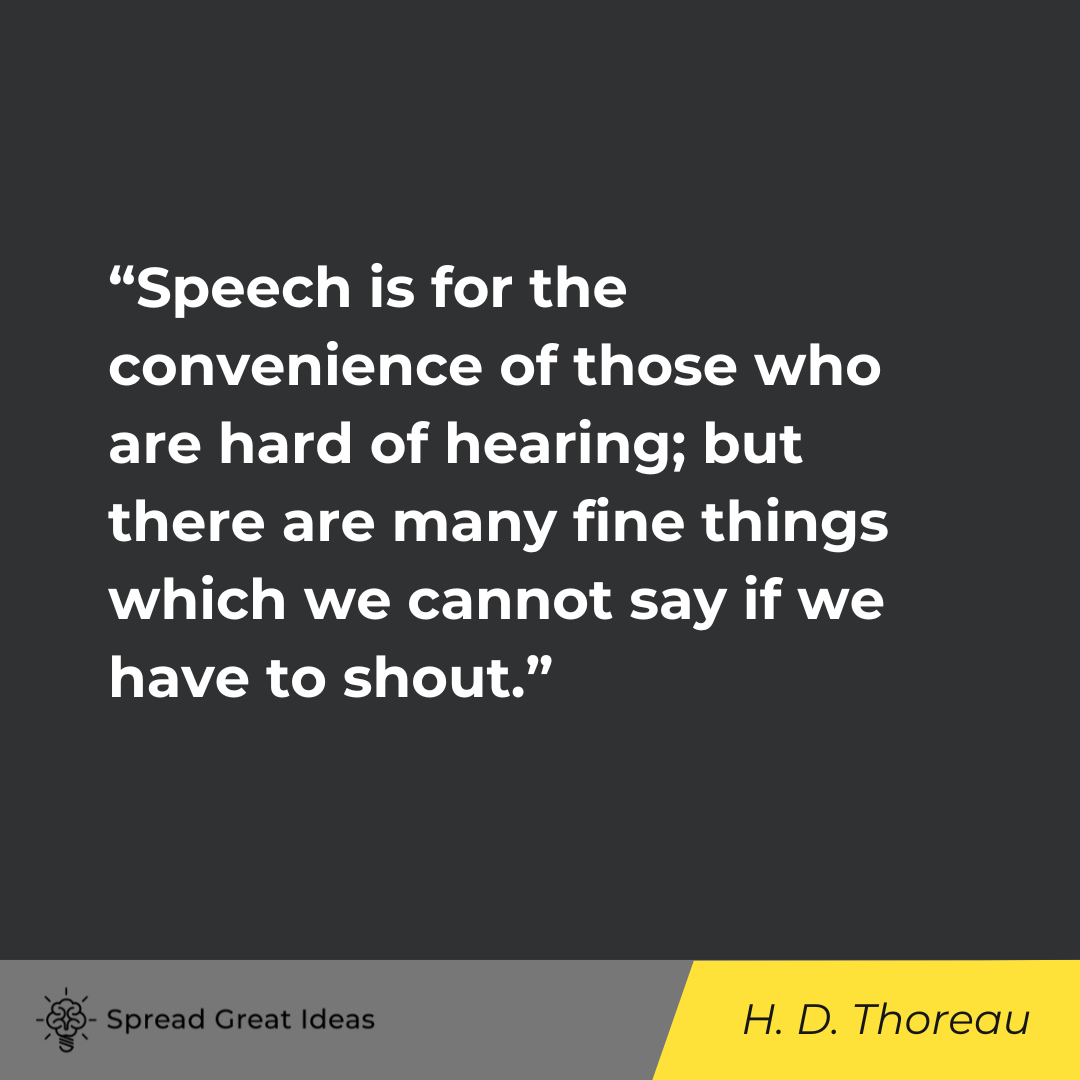
Henry David Thoreau offers a profound insight into the limitations of speech when it is amplified to the point of shouting. He suggests that the true beauty and depth of certain sentiments can only be expressed in the quiet nuances of communication. Thoreau challenges the notion that speech exists solely to accommodate those with impaired hearing, highlighting its potential for subtlety and finesse. By advocating for a softer approach to expression, he emphasizes the importance of restraint and mindfulness in communication. Thoreau’s words encourage us to appreciate the power of understatement and the eloquence found in the gentle cadence of genuine dialogue.
Calvin Coolidge
“It takes a great man to be a good listener.”
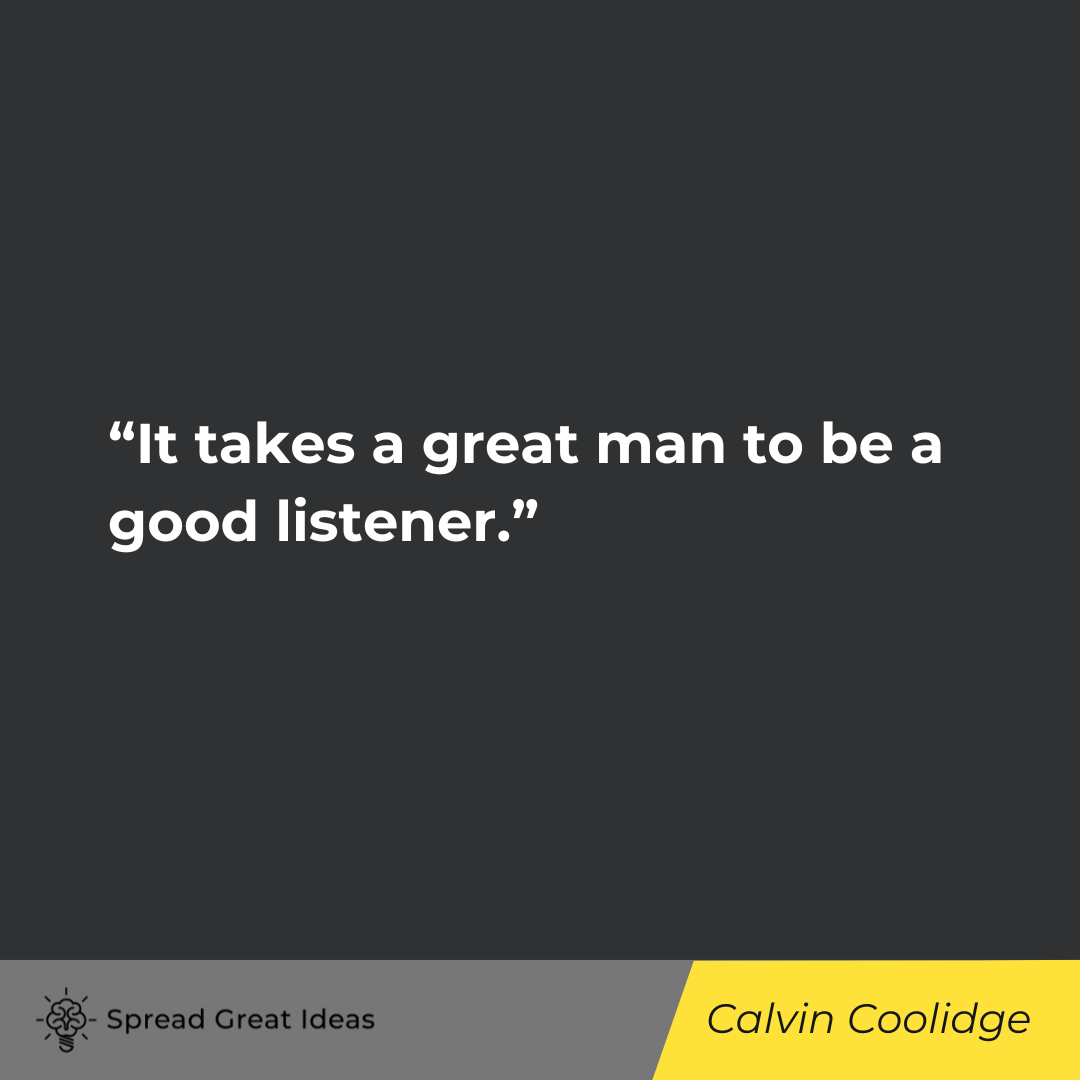
Calvin Coolidge succinctly encapsulates the profound skill of listening as a mark of greatness. In a world often focused on speaking and asserting oneself, Coolidge highlights the rarity and significance of those who possess the ability to truly listen. Being a good listener requires humility, empathy, and patience—qualities that elevate one’s character beyond mere accomplishments. Coolidge implies that to truly understand and connect with others, one must set aside their own ego and agendas, allowing space for others to share their thoughts and feelings. In this simple yet profound statement, Coolidge extols the virtues of attentive listening as a hallmark of true greatness.
